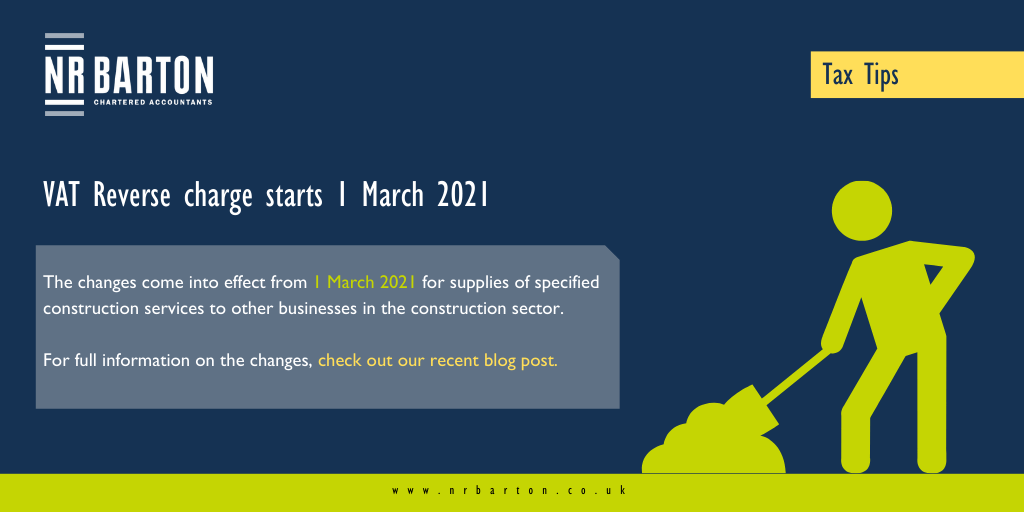From 1 March 2021 the domestic VAT reverse charge must be used for most supplies of building and construction services. The charge will apply to both standard and reduced-rate VAT services:
- for individuals or businesses who are registered for VAT in the UK
- reported within the Construction Industry Scheme
What is reverse charge for VAT?
The reverse charge is a mechanism for accounting for VAT whereby the customer charges themselves VAT, rather than the supplier charging VAT. The domestic reverse charge is commonly used to prevent missing trader fraud i.e. the supplier will charge VAT, be paid the VAT and then ‘go missing’ before they declare it to HMRC. As the reverse charge makes it the customer’s responsibility to account for VAT there is no opportunity for the supplier to disappear without paying the VAT to HMRC.
What services do the domestic reverse charges cover?
This domestic reverse charge will only apply to supplies of specified construction services to other businesses in the construction sector, including:
- constructing, altering, repairing, extending, demolishing or dismantling buildings or structures (permanent or temporary). This includes offshore installation services.
- constructing, altering, repairing, extending, demolishing of any works forming, or planned to form, part of the land, including (in particular) walls, roadworks, power lines, electronic communications equipment, aircraft runways, railways, inland waterways, docks and harbours, pipelines, reservoirs, water mains, wells, sewers, industrial plant and installations for purposes of land drainage, coast protection or defence
- installing heating, lighting, air-conditioning, ventilation, power supply, drainage, sanitation, water supply or fire protection systems in any building or structure
- internal cleaning of buildings and structures, so far as carried out in the course of their construction, alteration, repair, extension or restoration
- painting or decorating the inside or the external surfaces of any building or structure
- services which form an integral part of, or are part of the preparation or completion of the services described above – including site clearance, earth-moving, excavation, tunnelling and boring, laying of foundations, erection of scaffolding, site restoration, landscaping and the provision of roadways and other access works
What services do the domestic reverse charges not cover?
You should not use the charge for the following services, when they are supplied on their own:
- drilling for, or extracting, oil or natural gas
- extracting minerals (using underground or surface working) and tunnelling, boring, or construction of underground works, for this purpose
- manufacturing building or engineering components or equipment, materials, plant or machinery, or delivering any of these to site
- manufacturing components for heating, lighting, air-conditioning, ventilation, power supply, drainage, sanitation, water supply or fire protection systems, or delivering any of these to site
- the professional work of architects or surveyors, or of building, engineering, interior or exterior decoration and landscape consultants
- making, installing and repairing art works such as sculptures, murals and other items that are purely artistic signwriting and erecting, installing and repairing signboards and advertisements
- installing seating, blinds and shutters
- installing security systems, including burglar alarms, closed circuit television and public address systems
How do I prepare for the changes?
To ensure that you and your business are ready for reverse VAT, you will first need to make sure that your accounting systems and software can deal with the reverse charge, as well as considering how (if at all) the change will impact your cash flow. Finally, you should ensure that all your staff who are responsible for VAT accounting are familiar with the reverse charge and how it will work.
If the VAT reverse charge does not apply, you should continue to follow the normal VAT rules. The government have created flowcharts to help you decide if you need to use the reverse charge, these can be found here.
If you have any questions relating to the content in this article, please contact us via our website, or call us on 01942 242 245, and we will be happy to help.


